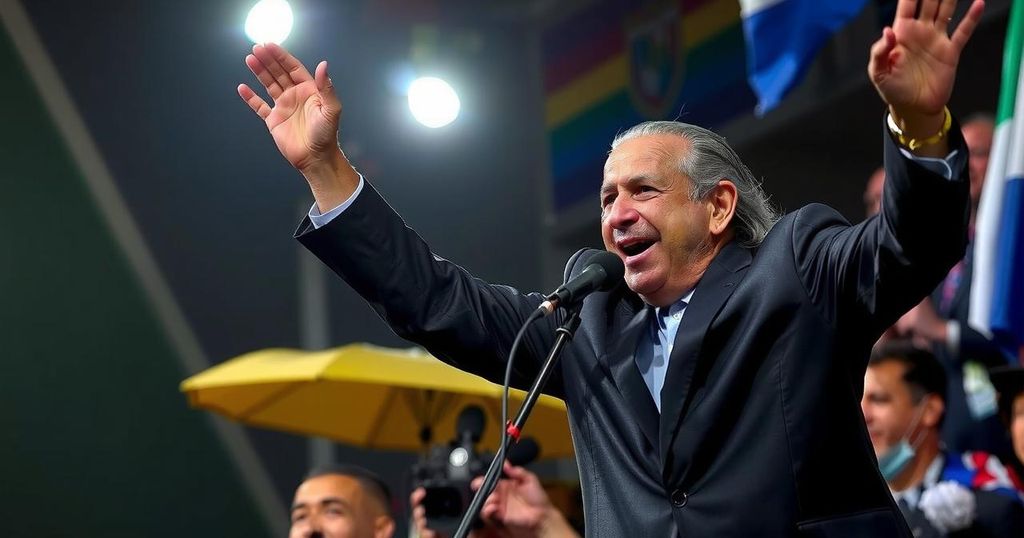Yamandú Orsi Elected President of Uruguay, Signaling Left-Wing Resurgence
Yamandú Orsi has been elected president of Uruguay, marking a return of the left-wing Frente Amplio party after five years of conservative rule. Orsi’s victory was celebrated by supporters as a sign of hope for addressing national challenges, including crime and economic recovery. While promising change, Orsi pledges a moderate approach to policy, influenced by the legacy of former president José Mujica, amid ongoing voter concerns over security.
Yamandú Orsi, the left-wing candidate from the Frente Amplio alliance, has been elected as the new president of Uruguay, marking a significant shift in the political landscape after five years of conservative governance. Official results revealed that Orsi received 1,123,420 votes, surpassing his opponent Álvaro Delgado of the National Party, who garnered 1,042,001 votes. Orsi’s victory reflects a growing desire among voters for a return to leftist policies, despite assurances that his approach will not dramatically alter the existing economic strategy.
In his victory address, Orsi emphasized the importance of national dialogue, pledging to engage citizens in seeking effective solutions for pressing issues such as crime and economic recovery. His win has been positively received, especially in Montevideo, where supporters celebrated the outcome of the election. Notably, Orsi’s campaign benefitted from backing by former president José “Pepe” Mujica, who remains a revered figure in Uruguayan politics despite battling health challenges.
The election occurs against a backdrop of persistent concerns over rising crime associated with drug trafficking and the lingering effects of the Covid-19 pandemic on the economy. While analysts predict no major shifts in economic policy, both Orsi and Delgado have committed to addressing the country’s security concerns and improving growth. Orsi’s party, the Frente Amplio, will control the Senate, although it holds a minority position in the Chamber of Representatives.
Uruguay’s political history reveals a pendulum swing between left and right governance, with the Frente Amplio previously holding power for three consecutive terms before transitioning to a conservative administration in 2020. The electorate’s preference for change is evident, as they seek solutions to ongoing challenges, such as crime and economic resilience. Voting is compulsory in Uruguay, reflecting its democratic values and commitment to civic participation.
Orsi’s presidency is anticipated to usher in progressive legislation reminiscent of earlier leftist policies, including social reforms that have characterized Uruguay’s recent history. The outcomes of this election indicate a yearning for the policies that many citizens associate with greater social equity and inclusive governance.
The recent presidential election in Uruguay saw a shift from conservative to left-wing governance, led by Yamandú Orsi of the Frente Amplio party. This marks a crucial moment in Uruguayan politics as voters express dissatisfaction with the previous government’s handling of key issues such as crime and economic instability. The political dynamics in Uruguay have historically oscillated between conservative and progressive coalitions, reflecting the electorate’s concerns over social and economic policies. Orsi’s alignment with former president Mujica further solidifies his connection to the country’s leftist legacy, which has included progressive reforms in social issues.
In summary, Yamandú Orsi’s electoral victory signifies a pivotal transition in Uruguay’s political landscape, reflecting a public desire for left-wing policies after five years under a conservative administration. Orsi’s commitments to dialogue and national solutions resonate with a populace concerned about crime and economic recovery. Despite potential challenges ahead, his presidency may revitalize progressive reforms that have historically contributed to Uruguay’s reputation as a stable democracy.
Original Source: www.lemonde.fr




Post Comment